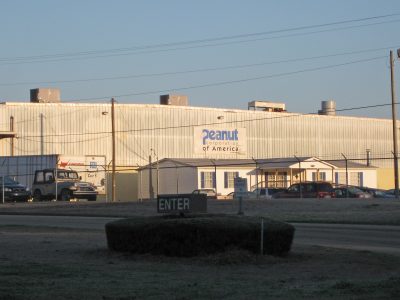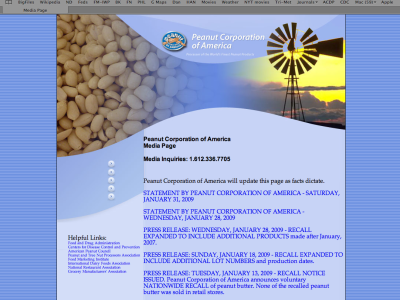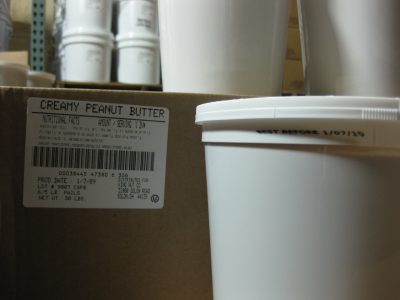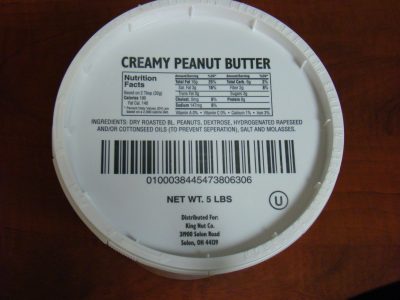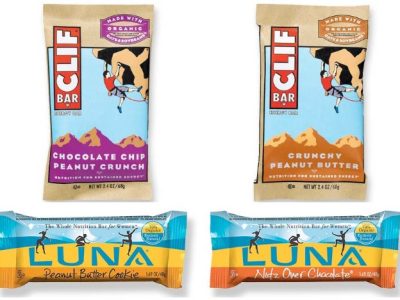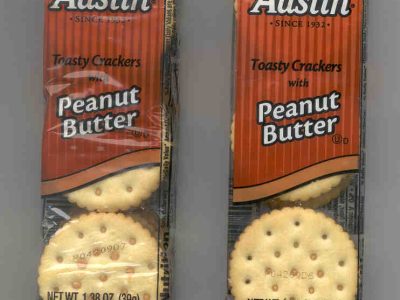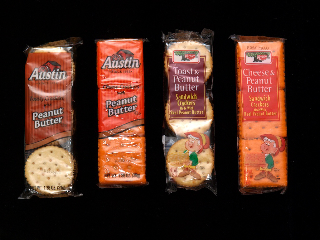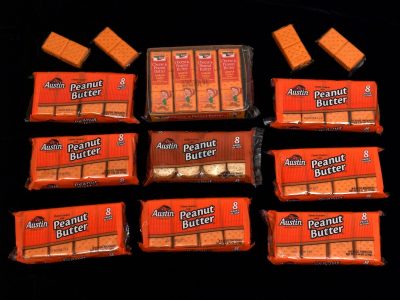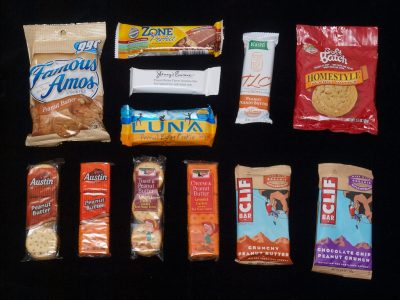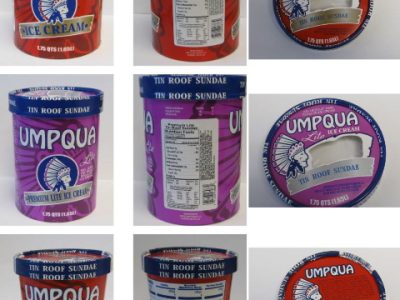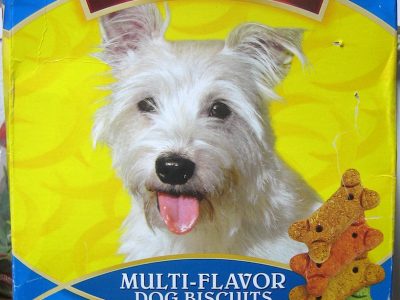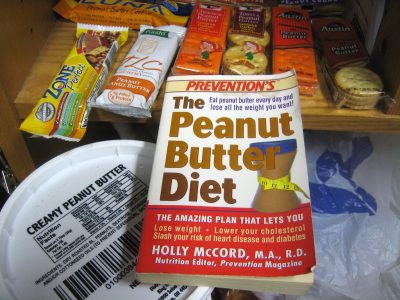| Outbreak: Peanut Corporation of America (PCA) | |
|---|---|
| Product: Peanut products | Investigation Start Date: 11/25/2008 |
| Location: Nationwide & Canada | Etiology: Salmonella serotype Typhimurium |
| Earliest known case onset date: 09/01/2008 | Latest case onset date: 04/20/2009 |
| Confirmed / Presumptive Case Counts: 714 | Positive Samples (Food / Environmental / Water): 17 / 0 / 0 |
| Hospitalizations: 171 | Deaths: 9 |
OUTBREAK SUMMARY:
The Peanut Corporation of America (PCA) outbreak of Salmonella Typhimurium resulted in one of the largest food recalls in the United States – 3918 peanut butter–containing products were recalled. The products were from over 200 food manufacturing companies. The recalls were too numerous to communicate, so for the first time, a FDA website was referenced to detail all known products associated with the recall. “This was an ingredient-driven outbreak, in which a contaminated ingredient affected many different products that are distributed through various channels and consumed in various settings.” Assistant Surgeon General Ali Khan (deputy director of the National Center for Zoonotic, Vector-Borne, and Enteric Diseases at the Centers for Disease Control and Prevention (CDC)) told Congress (in 2009) as he recalled the Peanut Corporation of America outbreak.“
A portion of PCA products were sold in bulk and sent directly to institutions for use or repackaging. Federal Emergency Management Agency (FEMA), schools and the US military were the recipients of some of those products. Food banks had to discard thousands of pounds of food.
Recalled products included brownies, cakes, candies, cookies, crackers, donuts, dressings and seasonings, prepared fruit and vegetable products, ice cream, peanut butter and products, pet foods, prepackaged meals, pies, snack bars, snack mixes and toppings. Most notable companies included Kellogg’s Keebler & Austin Peanut Butter Sandwich Crackers, Larabar, Clif, & Luna branded peanut containing bars.
The outbreak refocused national attention on food safety. In February 2009, Peter Hurley, a Police Officer in Portland, Oregon, whose son was a confirmed case in the outbreak, testified before the Congressional House & Energy Commerce Subcomittee on Oversight & Investigations. “As Jacob’s diarrhea continued my wife was given the okay from our pediatricians’ office for Jacob to eat his favorite comfort food, Austin Toasty Crackers with peanut butter. The very food that we later found was the cause of his poisoning. Here we have a boy, trying to get over food poisoning, with the one food that would seem safe, even to the people in the pediatric medical community, is the exact product that is continuing to poison him. A week later, Dr. Bill Keene, from Oregon’s Office of Disease Prevention & Epidemiology came to our house at 5 o’clock on Saturday night. As a friend said, this is like having the head of the FBI coming out to take fingerprints. On that Saturday night, Dr. Keene took custody of our supply of Austin Toasty Crackers with peanut butter manufactured by Kellogg’s with a PCA product. One week later, Dr. Keene called us to say that Jacob and the crackers he had taken from our house had an exact DNA subtype match for salmonella. Three out of the six packages of crackers he tested were positive and that was all that we had left.”
Those positive crackers were the first positive food samples that were not associated with the bulk institutional peanut butter products already named in the outbreak investigation. The positive lab results were out before the case control studies in Minnesota were finished. Those positive food samples expanded the trajectory of the outbreak recalls. It shifted the outlook from people served in institutional settings to anyone in their everyday life shopping at any grocery store. Later in the outbreak, Oregon confirmed salmonella in dog treats that were a match to the outbreak strain.
In January 2011, the Food Safety Modernization Act (FSMA) was signed into to law. Steps were added to prioritize prevention, strengthen surveillance and enforcement, and improve response and recovery. It changed the FDA’s (US Food and Drug Administration) focus from responding to outbreaks to preventing them. The FDA website states; “The Food Safety Modernization Act was the most sweeping reform of our food safety laws in more than 70 years.”
The PCA outbreak stands alone in the unprecedented criminal intent and prosecution of company executives. The Justice Department filed a 76 – count indictment against former PCA officials. The owner and president of PCA (Stewart Parnell) was found guilty of:
- conspiracy to commit mail fraud
- conspiracy to commit wire fraud
- conspiracy to introduce adulterated food into interstate commerce with intent to defraud or mislead
- conspiracy to introduce misbranded food into interstate commerce with intent to defraud or mislead
- adulterated food introduced into interstate commerce was adulterated because:
- It contained a poisonous or harmful substance which may have rendered it injurious to health
- It was prepared, packed, or held under insanitary conditions whereby it may have become contaminated with filth and thereby rendered injurious to health
The sentencing of the former PCA executives is the harshest ever imposed in a foodborne outbreak. In the grand indictment, it is stated: “On or about March 21, 2007, upon being told that salmonella testing results were not yet available and that shipment of a portion of a customer’s product would therefore be delayed, STEWART PARNELL stated, via email: “shit, just ship it. I cannot afford to loose [sic] another customer.”
In the indictment against the PCA executives, it states: “It was further part of the conspiracy that the defendants and others made false statements to their customers about the presence of salmonella in the … plant environment and in the products manufactured at the … plant, claiming that there had never been even a trace of a salmonella problem, when, in truth and fact, salmonella had previously been detected in the plant, and salmonella had been detected in the products manufactured there on numerous occasions every year dating back to 2003.”
The indictment also gives insight into the criminal intent through the email conversations presented, written by PCA executives: “On or about April 12, 2007, via email to UC #2, a PCA official suggested that totes of peanut meal at PCA Plainview be used to fill an order, noting that “[t]hey need to air hose the top off though because they are covered in dust and rat crap.” UC #2 forwarded said email to STEWART PARNELL, who responded: “Clean em all up and ship them…” A PCA official then instructed PCA Plainview employees, via email: “PLEASE, PLEASE make sure someone air hoses off the totes before they are loaded on the truck. They are filthy on top.””
In 2014, Stewart Parnell was sentenced to serve 336 months in prison to be followed by three years of supervised release. His brother, Michael Parnell, a food broker who worked on behalf of PCA, was sentenced to serve 240 months in prison to be followed by three years of supervised release.
In 2019, Stewart and Michael Parnell filed Habeas Corpus petitions (2255 Motions) to vacate their convictions and sentences claiming it violated the US Constitution. Stewart Parnell’s petition documented that the pre-trial local, state and national reporting of the nine deaths related to the outbreak and the damage done to the Georgia peanut industry was public knowledge at the trial. Parnell was allowed to proceed on two issues: jury prejudice and ineffective assistance. As of February 2024 Michael Parnell Habeas appeal is before the 11th Circuit Court of Appeals.
The Department of Justice assigned Stuart E. Walker from the U.S. Attorney’s office for the Middle District of Georgia as the government lead counsel for Parnell’s appeal. He said that the outbreak investigation involving PCA “revealed a broader criminal scheme. Parnell and others conspired to defraud PCA’s customers by concealing that its products had tested positive for salmonella and were produced under unsanitary conditions.”
“PCA and Parnell assured many customers that its products were made ‘following good manufacturing practice, ‘were not ‘adulterated or misbranded, or unsafe within the meaning of the Federal Food, Drug, and Cosmetic Act,’ and were ‘free of any foreign materials, or any substances which are poisonous, pathogenic, unlawful, toxic or in any way injurious.’” (ECF No. 565 at 24-25, Gov’t Ex. 46-16.) “But in reality — and at Parnell’s direction — PCA knowingly shipped or released products to customers before receiving the results of microbiological testing. PCA knowingly shipped products that tested positive for salmonella or were outside microbiological specifications by repeatedly retesting peanut products until negative results were achieved.”
As of April 19, 2024, the petitions for both men will likely be heard in September 2024 by the US Court of Appeals for the 11th Circuit.
- Salmonella Typhimurium Hypothesis Generating Questionnaire
- Salmonella Typhimurium (Clusters 0811SDCJPX-1c and 0811MLJPX-1c) Case Control Study #2 and Case-Series – Version 1 Final, 1/17/2009
- OR & WA PFGE
- Food Safety & Defense Alerts Recall/Outbreak Bulletin 26-Jan-09 (D) Monday
- Timeline of Infections: Multistate Outbreak of Salmonella Infections Associated with Peanut Butter and Peanut Butter-Containing Products – United States, 2008-2009
- MMWR: Multistate Outbreak of Salmonella Infections Associated with Peanut Butter and Peanut Butter–Containing Products — United States, 2008–2009
- NEJM Salmonella Typhimurium Infections Associated with Peanut Products
- NEJM Appendix Salmonella Typhimurium Infections Associated with Peanut Products
- 01/17/2008: CDC Health Advisory
- 01/28/2009: FDA Redacted Inspection Report
- 02/12/2009: TX PCA Emergency Order
- 2008-2009 Salmonella Typhimurium Outbreak Response After Action Report
Publication citation: Cavallaro, E., et al. Salmonella Typhimurium Infections Associated with Peanut Products. New Engl J Med 2011; 365:601-10.
Other reference links:
- 02/05/2009: Reuters suspended from federal government contracts
- 02/11/2009: C-SPAN Peanut Corp. of America Owner Pleads the 5th
- 01/04/2011: FDA Food Safety Modernization Act
- 06/26/2011: C-SPAN Peanut Butter Salmonella Outbreak
- 02/21/2013: Federal Criminal Charges
- 09/21/2015: Parnell Sentencing
- 11/07/2017: Oral Argument Recording File: United States v. Michael Parnell, Mary Wilkerson, Stewart Parnell

